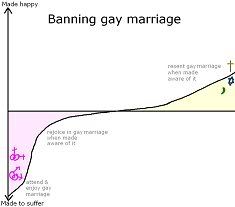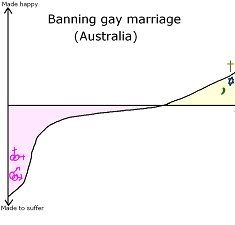Arepo wrote:That said, util is emphatically not a methodology - it's just an arrow pointing towards a goal.
I’m confused by that, to be honest. I understand (or at least I think I do) the goal of utilitarianism, but in brief time that I’ve tried to understand it, I’ve come across Bentham’s “felicific calculus”, which, of course as I’m sure you know, is the analysis based on certain rules, i.e., a methodology. Apart from that, there seems to be an analysis in utilitarian philosophy in some respects regarding, as you’ve stated, the contemplation of facts and probability. Perhaps you could clarify what you meant when you said utilitarianism is emphatically not a methodology.
Then I can't say much without knowing what the supposed rebuttals are. If you're just saying that people have argued against those points, I don't really see a problem. Creationists haven't argued against just about every generalised claim about evolution scientists have ever made, but that doesn't make their arguments equivalent. If you're saying that people have offered solid evidence/logic based grounds for accepting P8, then I'm deeply sceptical, but if I saw the arguments, and they seemed sound, I'd accept P8. The Jim Crow laws you're also talking about seem like good reason for me to be sceptical - if the same arguments were made back then, but we now live in a world where getting rid of them seems to have done a lot more good than harm, the arguments were evidently unsound. So we'd need extra evidence to accept the same arguments now...
I’m sure you’ve heard variations of some of those supposed reasons for not legally recognizing same-sex marriages, but I’ll identify some of them here for the sake of continuing the dialogue:
For starters, there are the wholly absurd reasons like, “They can’t procreate!”, which is easily rebutted by their inconsistent position that they wouldn’t prohibit marriage between, say, opposite-sex infertile couples or, say, opposite-sex octogenarians.
But then, there are other articulated reasons that aren’t as easy to brush off (not to say that they’re valid at all, just that it requires a bit more effort to refute). For example, the decaying of the traditional nuclear family that purportedly has been the backbone of human civilization…yada yada… There’s also the allegation that the children who are reared by gay parents will suffer emotional hardship, and that the optimal environment for the psychological well being of a child is in an environment with one man and one woman…blah blah blah… Gay marriages impact and diminish the value of traditional marriages…etc.
On the one hand, Ryan said that beliefs aren’t invalidated under utilitarianism. Once again, perhaps I’ve conflated what Ryan actually meant by that, but if I take what he said at face value, there is essentially an impasse amongst the two opposing sides, which (all things being equal) may result in the erosion/elimination of a lot of the rights that I’ve pointed to thus far in this thread. This raises some serious red flags for me.
On the other hand, you’ve suggested that the reasons that the anti-same-sex marriage folks articulate can and will be subject to at least some amount of scrutiny to presumably test their validity. But even then, you’ve acknowledged that the possibility remains that there could be instances where the rights that I had previously discussed may be trumped (again, all things being equal), which again raises the red flag as far as I’m concerned.
But on the other other(?) hand, I also note that you’ve suggested that those rights that I’ve mentioned may be preserved (again, all things being equal), but if that’s true, I don’t see the need to “re-invent the wheel” so to speak. Yes, I hear what you saying about there being a reason/rationale for taking the appropriate actions under utilitarianism, and that that’s a hallmark trait of utilitarianism, but then again, there is also a healthy body of reasoning in those numerous court decisions that have supported those constitutional rights that I’ve discussed above.
Arepo wrote:Incidentally, I don't think you can have it both ways as an argument against util - either the current US system is basically shown by evidence to be about the most welfare-generative model you could have, in which case thinking about it from a utilitarian perspective is unlikely to make it change much (though it would hopefully prompt at least minor improvements), or the evidence is strongly against it being as effective as alternatives, in which case if you're supporting it for even vaguely utilitarian reasons you should want to change it too.
Well, for starters, I’m not opposed to utilitarianism per se. Indeed, I think the individuals in the Executive and Legislative branches of US gov’t especially in the recent past would’ve done well to incorporate more utilitarianism into their actions rather than succumbing to their latent and patent imperialistic and/or self-preservation tendencies.
Nevertheless, I don’t necessarily agree that wholesale changes are required either for the reasons that I’ve mentioned previously.
Arepo, I have a question for you. I note that you’ve said before that utilitarianism can and should be applied to all decisions. Are you adverse to limited applications of utilitarianism? In other words, where utilitarianism is used to supplement rather than override. To me, that seems to have more appeal from a practical standpoint even if it means that there's a "disingenuous" component to it. Additionally, Rome not being built in a day and all that, the partial or supplemental approach may be more palatable to the populace. Yea/nay?




